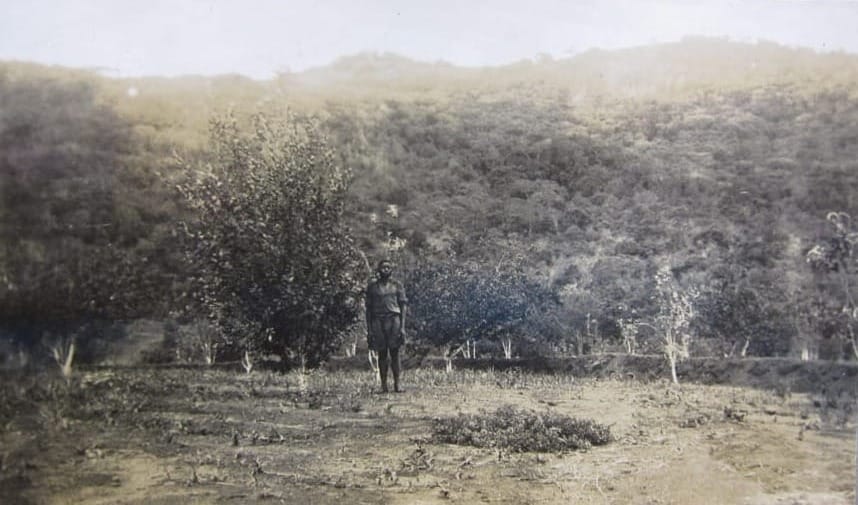All in a Day's Work
One day, after a hard day’s work tending his fruit trees, Edgar had all his workers go home in the best of health about five o’clock as usual.

About half-past-nine that night after Edgar had retired to bed and was reading by the light of the hurricane lamp, there was an urgent knock on the door. One of his workers reported that a member of the gang who had gone off work at five o’clock was coughing up blood in great quantities and was very near death.
Edgar threw on some clothes and picked up the medicine chest, fearing that it was some kind of poisoning.
By the light of the first quarter moon, they followed a series of twisting precipitous footpaths, descending about fourteen hundred feet over about a mile and a half. The sound of the women ululating echoed off the mountains. Edgar quickened the pace.
They arrived at the hut at about a quarter past ten to find twelve or thirteen women, both the wives of the sick man and the neighbors, wailing and weeping, along with two or three of his other workers. Edgar threw everyone out of the hut, keeping only the one who was most sensible.
It was ironic that in this empty country African huts were overcrowded, and windowless, but in the single open doorway Edgar managed to stir the air. He propped the patient up against a few logs to make him as comfortable as he could between his violent coughing spells into a basin.
About one o’clock he was very much better but still believed that he was bound to die before morning. When an African was quite sure he was going to die he usually did, so Edgar told him that he need not come to work the next day nor the day after but the day after that, he must come or he would be disciplined.
Immediately his whole face lit up. For the first time he obviously believed that he was going to recover. Having reassured him, Edgar left about half past one and said he would return to check on him in the morning.
The moon had set. There was only one hurricane lamp available to light the route. The family lent Edgar a twelve-year-old to guide him back up the steep intricate footpath. They had gone perhaps three hundred yards when Edgar became aware of a very powerful smell, which was something like half a dozen foxes, accompanied by the coughing grunt of a leopard following them up the path.
The piccanin tried to run away–but he was carrying the only light. Edgar grabbed the piccanin by the back of his collar. He had left the house in such a hurry with the medicine chest it had never occurred to him to bring a firearm!
Under the circumstances, he decided his best defense was to sing as loudly as possible to scare off the leopard. Gilbert and Sullivan fortissimo kept the leopard at a respectful distance for at least a mile, until he came in sight of the compound where his African house staff slept.
He left the piccanin in the hut of one of his staff for the night as nothing would have induced him to make the return journey. Edgar himself, on getting into the house, proceeded to take two of the stiffest whiskies he ever had in his life.
A few days later, a doctor visiting the area diagnosed the patient with TB. He explained that the worker had unquestionably burst a blood vessel, but should live for some years yet. Besides leaving a script, he advised that the hut be burned down and a new one constructed. The patient was able to return to light duties for a time although Edgar was careful not to have him undertake any heavy work. He lived another three years.
The leopard story gradually circulated amongst the neighbors. In due course Edgar received a letter from the local secretary of the Rhodesian SPCA threatening him with prosecution for cruelty to one leopard pointing out that listening to Edgar singing at full volume was nothing less than pure torture.
The historical novel Whitewashed Jacarandas and its sequel Full of Possibilities are both available on Amazon as paperbacks and eBooks.
These books are inspired by Diana's family's experiences in small town Southern Rhodesia after WWII.
Dr. Sunny Rubenstein and his Gentile wife, Mavourneen, along with various town characters lay bare the racial arrogance of the times, paternalistic idealism, Zionist fervor and anti-Semitism, the proper place of a wife, modernization versus hard-won ways of doing things, and treatment of endemic disease versus investment in public health. It's a roller coaster read.
References:
- Sir Edgar Whitehead's Unpublished Memoirs, Rhodes House, Bodleian Library, Oxford University, by permission.
- Photo credit: Sir Edgar Whitehead's Unpublished Photograph Albums, Rhodes House, Bodleian Library, Oxford University, by permission.

